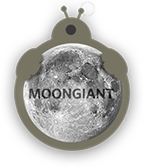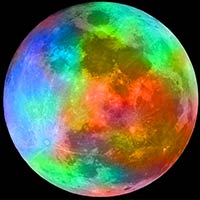
 February 14 Waxing Crescent 29% |
 February 15 Waxing Crescent 40% |
 First Quarter Illumination: 51% |
 February 17 Waxing Gibbous 61% |
 February 18 Waxing Gibbous 71% |
Moon Phase: February 16, 2024
On this day the Moon was in a First Quarter phase. This phase occurs roughly 7 days after the New Moon when the moon is one quarter of the way through its orbit around the earth. Exactly half the moon will be illuminated and half dark. On the day of the First Quarter phase the moon is high overhead at sunset and is visible until mid-night when it sets in the west. The First Quarter phase is a one-day event and in the following days enters a Waxing Gibbous phase becoming more illuminated each day until the Full Moon.
Visit the February 2024 Moon Phases Calendar to see all the daily moon phase for this month.
First Quarter Phase
The First Quarter on February 16 has an illumination of 51%. This is the percentage of the Moon illuminated by the Sun. The illumination is constantly changing and can vary up to 10% a day. On February 16 the Moon is 7.46 days old. This refers to how many days it has been since the last New Moon. It takes 29.53 days for the Moon to orbit the Earth and go through the lunar cycle of all 8 Moon phases.
Today's Moon Sign: ♓ Pisces
The current zodiac moon sign is Pisces, positioned at 16.55° within the sign. The Moon entered Pisces on Loading... and will shift into Aries on Loading.... The zodiac moon sign represents the position of the Moon as it moves through the twelve signs of the zodiac. Each zodiac moon sign lasts about 2 to 2.5 days as the Moon travels through that part of the sky.
The 8 Lunar Phases
There are 8 lunar phases the Moon goes through in its 29.53 days lunar cycle. The 4 major Moon phases are Full Moon, New Moon, First Quarter and Last Quarter. Between these major phases, there are 4 minor ones: the Waxing Crescent, Waxing Gibbous, Waning Gibbous and Waning Crescent. For more info on the Moon Cycle and on each phase check out Wikipedia Lunar Phase page.
Phase Details for - February 16
Illumination: 51%
Moon Age: 7.46 days
Moon Angle: 0.53
Moon Distance: 377,208.80 km
Sun Angle: 0.54
Sun Distance: 147,807,573.99 km
Useful Moon Resources
Check the weather before a night of Moon gazing at weather.com
For a list of all the current meteor showers visit American Meteor Society
First Quarter Moonrise and Moonset


